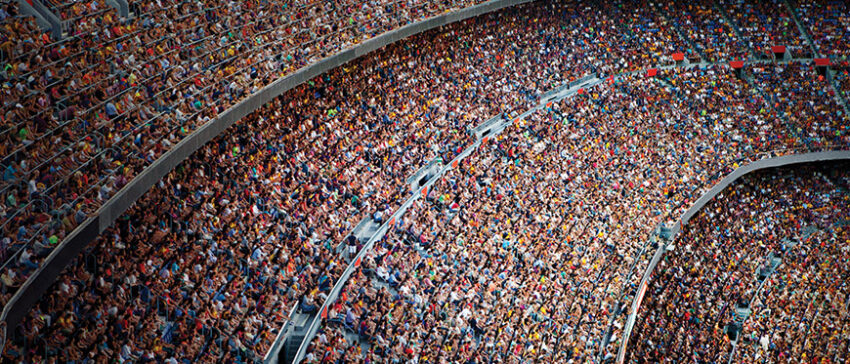It makes sense that the family would be the foundation of the group, as interdependence defines both words “family” and “group”. However, this does beg the question – is there a perfect size to groups for best “results”, for lack of a better word? Logic would follow that, as groups are defined by interdependence, and families are the foundation of groups, that groups of smaller size would be ideal.
Large Groups Are Problematic
Rousseau, Tullock, de Jouvenel, Harris and Sherblom all focus on the problems found in large groups in their discussions of ideal social group size:
“…there are limits to the size of a well-constituted state. In every political body, there is a maximum strength, which it cannot exceed, and from which growth often makes it deviate. The more the social bond is stretched, the more slack it grows, and a small state is generally stronger in proportion to its size than a large one,” wrote Jean-Jacques Rousseau in ‘On Social Contract’.
Gordon Tullock in ‘The Politics Of Bureaucracy’ suggested that “goal displacement and risk avoidance motivated by individual self-interest will generate organizational dysfunctions” in very large public bureaucracies when individuals and groups within the organization “create opportunities for side payoffs, including graft and corruption.”
Betrand de Jouvenel in the “The Group” section of his, ‘Sovereignty: An Inquiry Into The Political Good’, wrote: “If it is neither natural nor possible for man to live in isolation, neither is it necessary for him to be embodied in groups of the size and complexity that we now see… When the number of citizens is too great for intimacy between them to be possible, the harmony will be less intense.”
And, in the “Of Social Friendship” section of this same work de Jouvenel stated: “… in any large society the common good does not greatly interest more than quite a small part of its members… “The intensity of the common emotion is in inverse ratio to the size of the society. For a very small society, a funeral is an occasion in common, for a very large society deaths are a matter of statistics, and occasions of common joy or sorrow become ever more rare.”
de Jouvenel also wrote: “The wider and more developed a society is, the less can the climate of trustfulness be the fruit of a spirit of community, the widening of the circle and the growing diversity of personalities tend to destroy that spirit. It should be taken as obvious that a circle of men will have more things in common the narrower and more homogeneous it is, and fewer things in common the more numerous and variegated it is.”
Finally, according to Thomas Harris and John Sherblom in ‘Small Group And Team Communication’, “The larger the group grows, the more likely it is to subdivide.”
Small Groups Are Most Productive
Olson, Slaughter, Adams and Galanes all focus on small groups in their discussions of ideal social group size:
Mancur Olson stated that, “Unless the number of individuals is quite small, or unless there is coercion or some other special device to make individuals act in their common interest, rational, self-interested individuals will not act to achieve their common or group interests.” – ‘The Logic Of Collective Action’
According to Anne-Marie Slaughter, “Only relatively small groups share enough and are sufficiently influenced by one another for an idea to take hold among them.” – ‘The Chess-Board & The Web’
Finally, according to Katherine Adams and Gloria Galanes, “If there are more than eight members, it becomes a challenge to have equal participation, where everyone has a chance to speak, listen, and respond.” – ‘Communication In Groups: Applications & Skills’
Final Thoughts
The evidence is compelling: when it comes to group effectiveness, smaller is generally better. From Rousseau’s observation that social bonds weaken as they stretch, to modern research on team dynamics, the message remains consistent—intimacy, trust, and shared purpose naturally diminish as groups expand.
This isn’t just theoretical musing. We see this principle play out daily in our workplaces, communities, and social circles: Large committees struggle to make decisions, mega-corporations battle bureaucratic dysfunction; meanwhile, small teams innovate rapidly, tight-knit communities support each other through crises, and family businesses often outmaneuver their corporate competitors through sheer cohesion.
This presents a paradox for our increasingly connected world: How do we maintain the benefits of small-group dynamics while addressing challenges that require large-scale coordination and cooperation? Perhaps the answer lies not in abandoning large organizations altogether, but in thoughtfully structuring them as networks of small, empowered teams—preserving the human-scale interactions that foster trust, accountability, and genuine collaboration.
The family remains our template for a reason. In seeking the ideal group size, we’re really seeking to recreate those fundamental qualities of mutual dependence, shared identity, and personal investment that make families work. The smaller the group, it seems, the easier it is to maintain these essential human connections.
Thanks for reading!
